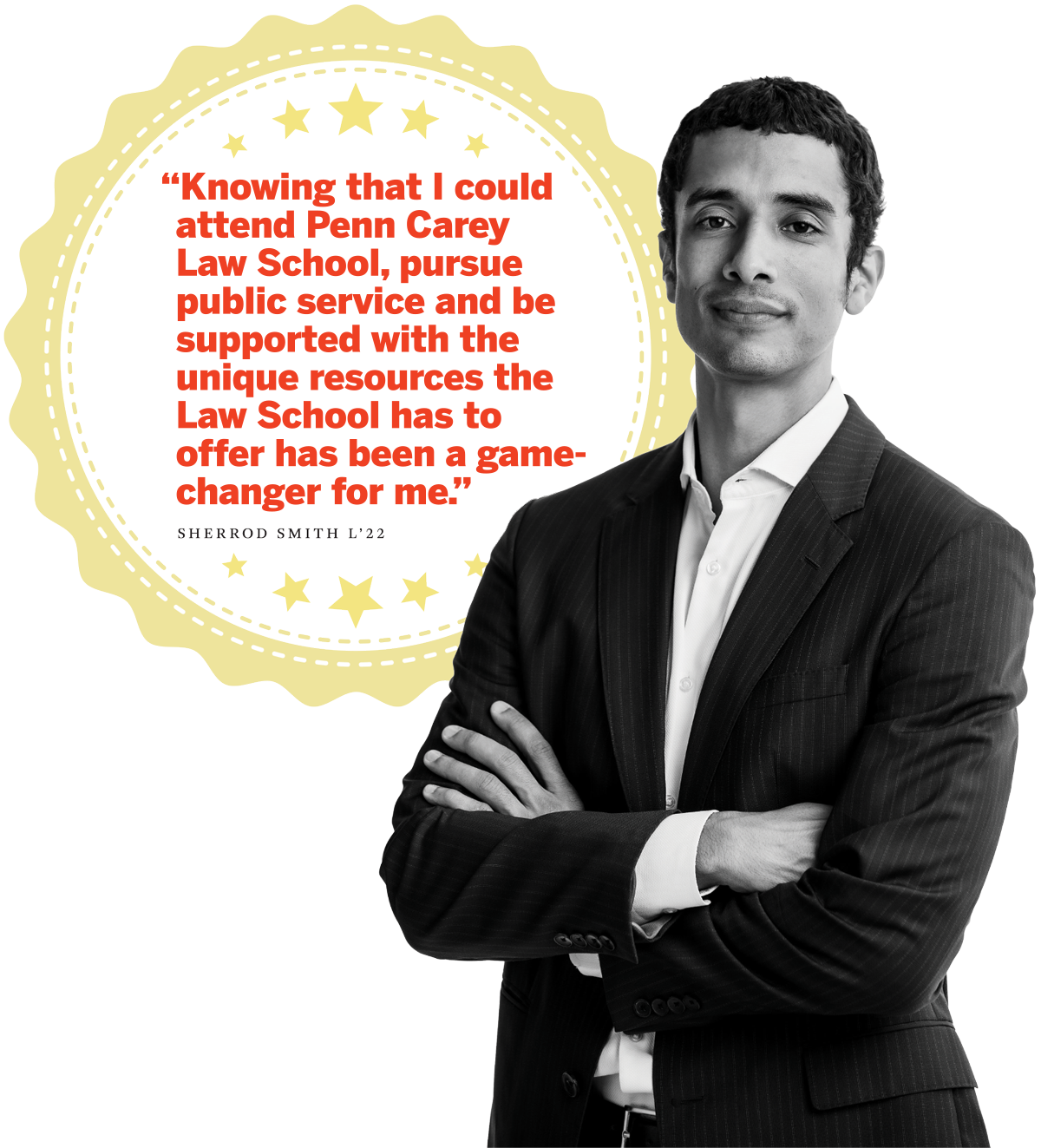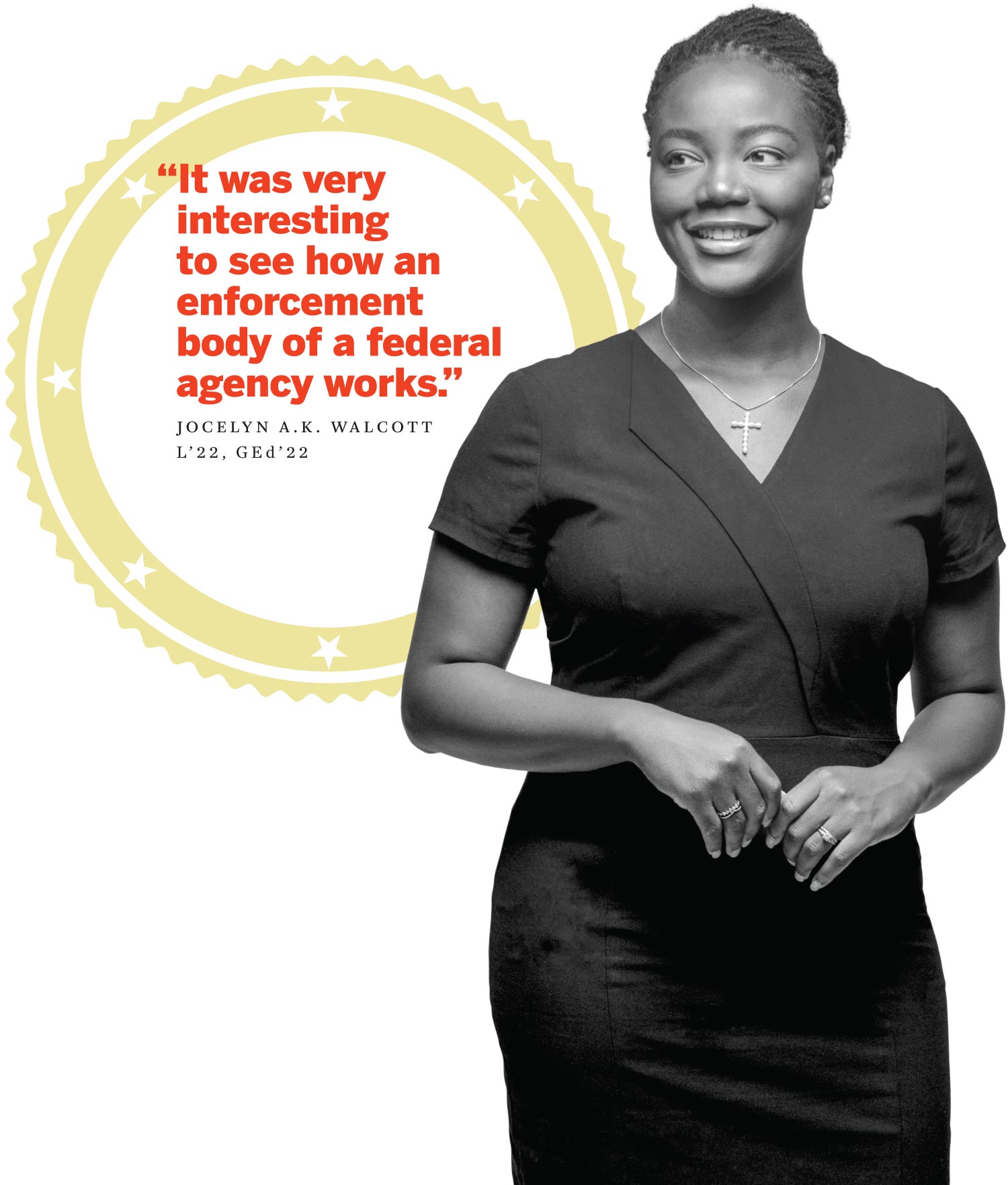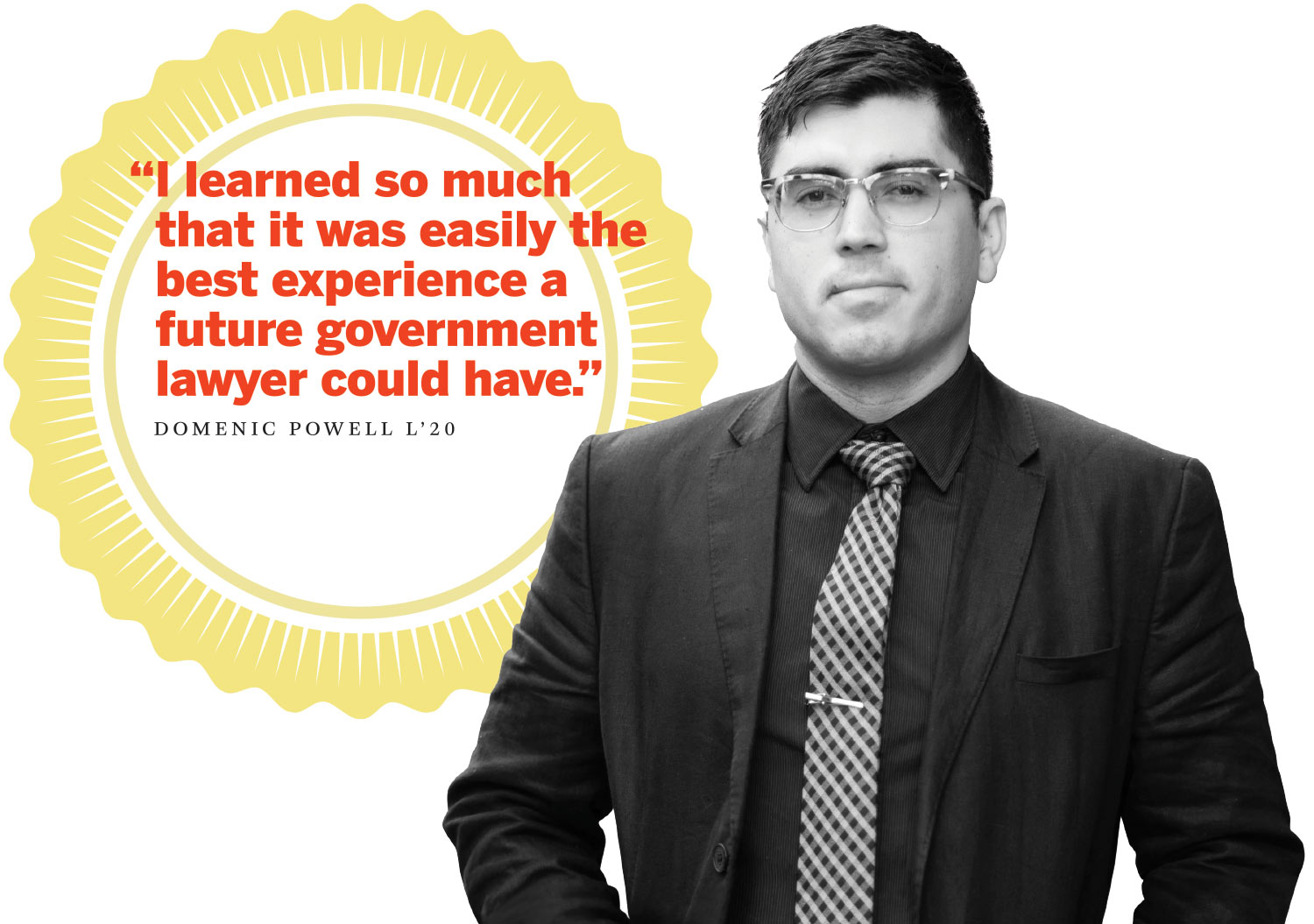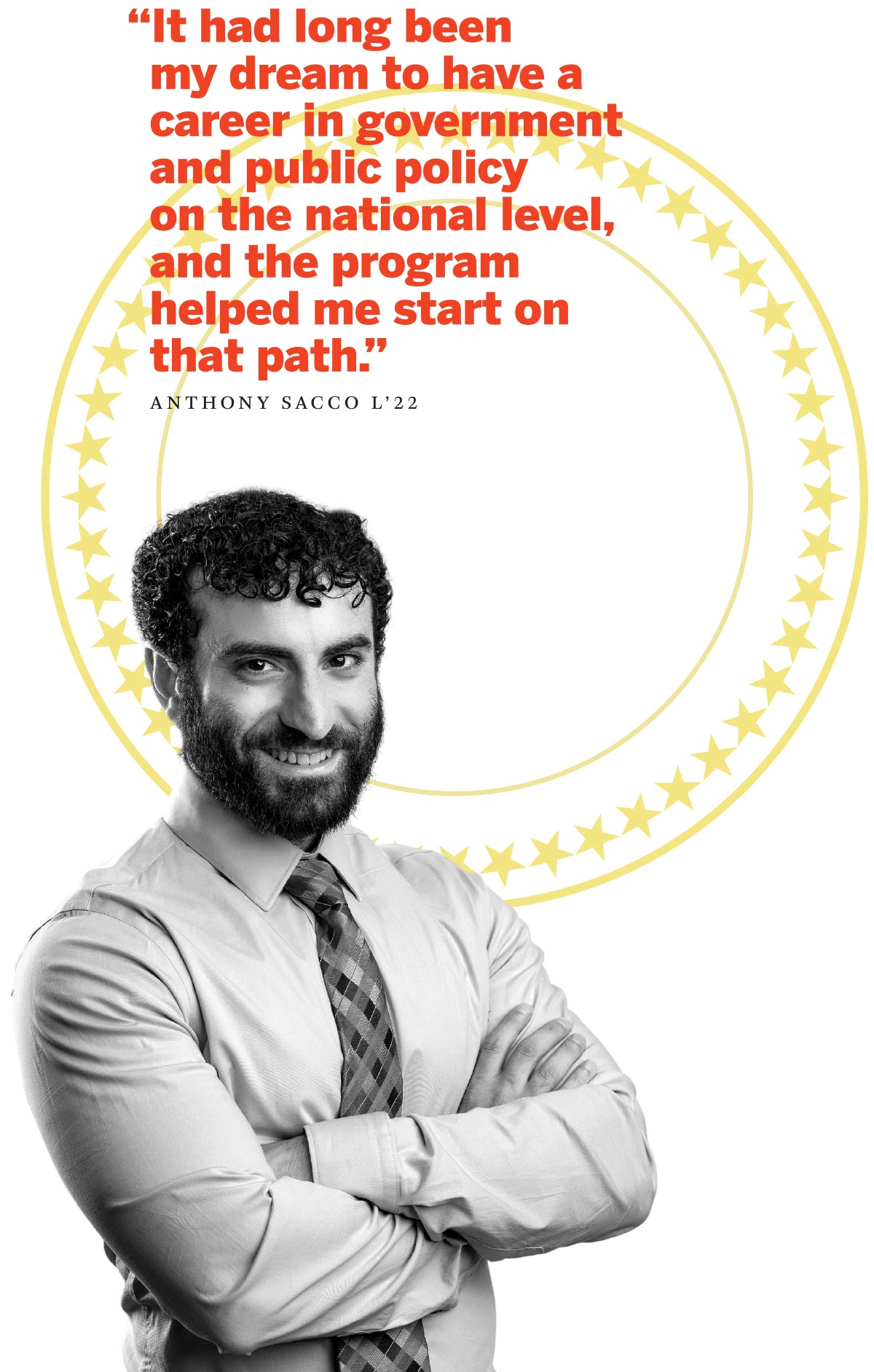
Government
Pipeline
By Larry Teitelbaum
herrod Smith L’22 is pursuing his dream. Starting this fall, he will be working on civil rights and public corruption cases, police policy, and post-conviction review on sentencing law as an Honors Attorney in the New Jersey Attorney General’s Office, Office of Public Integrity and Accountability.
For Smith, the Leo Model Foundation Government Service and Public Affairs Initiative “anchored his experience” at the Law School, connecting him to a supportive community of public service-oriented students and alumni and encouraging his personal and professional aspirations.


Coglianese conceived of the Initiative. “We are giving students unique learning opportunities. The program succeeds by helping students understand government better and teaching them how to analyze and improve legislation, regulation, and other public policies,” said Coglianese, who is also Director of the Penn Program on Regulation. “This is what this program is all about and why it has been extraordinarily successful.”
The Law School has a tradition of alumni who have used their legal training as a springboard to government service, including U.S. Representatives Conor Lamb C’06, L’09, and Mary Gay Scanlon L’84, Colorado Secretary of State Jena Griswold L’11, and Dallas Mayor Eric Johnson L’03.
For example, the Initiative supported Anthony Sacco L’22 to pursue work on the U.S. Senate Finance Committee’s tax team, an opportunity originally afforded to him through the Law School’s Legislative Clinic.
Noting the scarcity of opportunities in the legislative branch, Sacco seized on the chance to further his experience on the Committee as a Model summer fellow in 2021. Congress had just passed new legislation to extend pandemic-era unemployment benefits, so Sacco was well-positioned to conduct related research and write memos and talking points. In addition, he worked on state sales tax policy and attended meetings on proposed legislation for pass-through businesses.
“It had long been my dream to have a career in government and public policy on the national level, and the program helped me start on that path,” Sacco said. “I found my way to an incredible opportunity at the IRS Office of Chief Counsel for after graduation. The support and funding from the Leo Model Foundation was crucial to pursuing these opportunities and building a network in Washington, D.C., and I am forever grateful.”
Prior to law school, Sacco spent five years working on the Joint Committee on Revenue in the Massachusetts Legislature. After completing his four-year dual degree program with the Law School and the Harvard Kennedy School of Government, Sacco in September joined the Internal Revenue Service as a staff member in the Passthroughs & Special Industries Division, where he helps draft regulations, provides guidance to the public on rules and regulations, and advises field offices on litigation.
Jocelyn A.K. Walcott L’22, GEd’22, also a Model summer fellow, gravitated to government service because her parents and grandmother worked for the State of New Jersey and for county and local government.
In the summer of 2020, Walcott completed the fellowship at the Department of Education’s Office of Civil Rights where she investigated alleged civil rights violations, reviewed complaints for which she developed the factual record, and conducted interviews.
“I had an exciting experience. It was very interesting to see how an enforcement body of a federal agency works.” She reported to Wendella Fox CW’73, L’76, who, before her recent retirement, was Regional Director of DOE’s Office of Civil Rights in Philadelphia. “Over the course of my internship, I was fortunate to see almost every part of the complaint process. By the end of the summer, I was able to take the lead in conducting interviews.”
Walcott will be clerking for two judges in the Middle District of North Carolina over the next two years, after which she expects to practice equity law throughout her career.
As part of the Initiative, senior government officials and policy experts have visited the Law School to teach seminars and short courses, give lectures, and advise students on career options. These visiting fellows have ranged from top-level White House officials to heads of federal agencies to major local leaders. Among them was Richard Cordray, the first Director of the Consumer Financial Protection Bureau.
“The Penn Carey Law community — both students and faculty alike — presented a rich and challenging atmosphere,” said Cordray, now the Chief Operating Officer of Federal Student Aid in the U.S. Department of Education. “They were constantly questioning how and why we organize ourselves and about our rules. It made me think anew about many issues I had come to take for granted.”
Since the program’s inception, approximately 150 students have received direct financial support to pursue their career goals through summer and post-graduate fellowships and externships, Borshansky said. There have also been more than a dozen policy research seminars along with numerous conferences and panel discussions through which many students and alums have found inspiration for public service and prepared themselves to pursue government careers.

Powell, who took Coglianese’s Regulatory Law and Policy seminar and served as Chair of the Environmental Law Project, spent a semester working as a full-time legal extern at the House Judiciary Subcommittee on Antitrust Commercial and Administrative Law, an opportunity made possible through the guidance and support of the Initiative.
“I learned so much that it was easily the best experience a future government lawyer could have,” Powell said.
Nearly three years later, Powell is about to complete his second year as an Honors Attorney at the Consumer Financial Protection Bureau.
“I’m a first generation (college) student. I don’t have any connections on the Hill,” Powell said. “I don’t know anybody who’s doing anything like this. For a student like me to have the opportunity I did, I absolutely needed people like Professor Coglianese and others to make those connections. It wouldn’t have happened any other way.”

He then worked for the Lawyers Committee for Civil Rights Under Law, helping to launch the Stop Hate Project, coordinating with community-based organizations, law enforcement officials, civil rights organizations, and academic experts to develop a cohesive hate crimes response strategy.
During law school, Smith served as a Model summer fellow with the Civil Rights Bureau of the New York Attorney General’s Office. Putting his legal education to use, Smith worked on a hate crime investigation and assisted the Office’s litigation efforts to preserve the Deferred Action for Childhood Arrivals program.
Smith, who graduated with a four-year joint degree from the Law School and the Princeton University School of Public and International Affairs, recognized that students at top law schools like Penn Carey Law have their choice of exceptional career paths.
But he said that, “knowing that I could attend Penn Carey Law, pursue public service, and be supported with the unique resources the Law School has to offer has been a game-changer for me personally and for many of my peers. Through the Leo Model Foundation, the Law School encouraged me and nurtured my interest in serving as a public service attorney.”